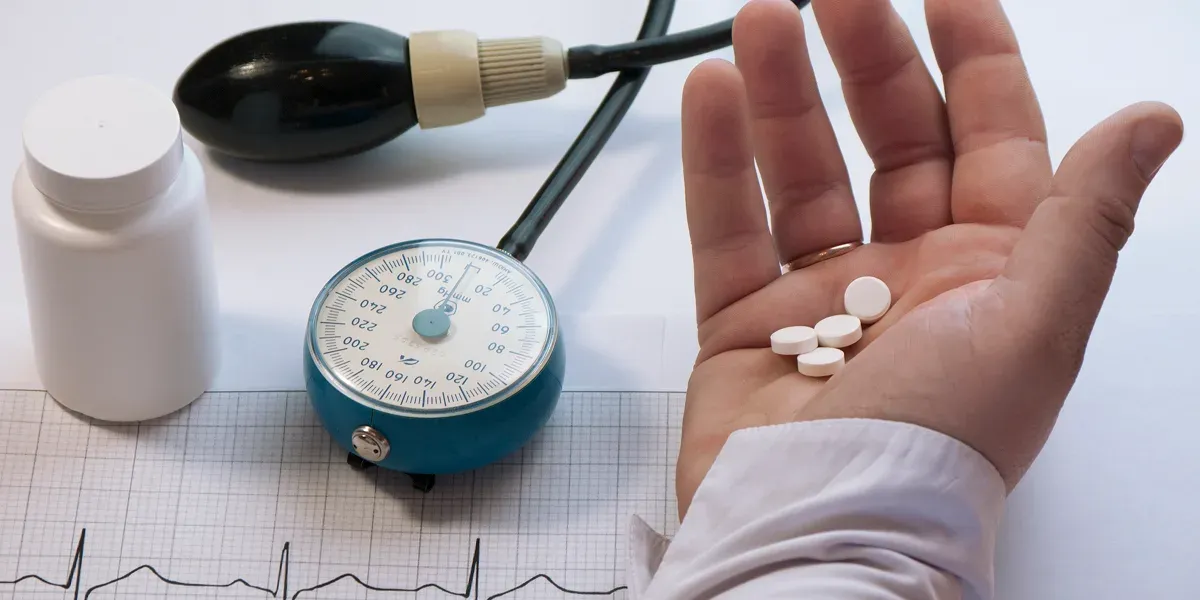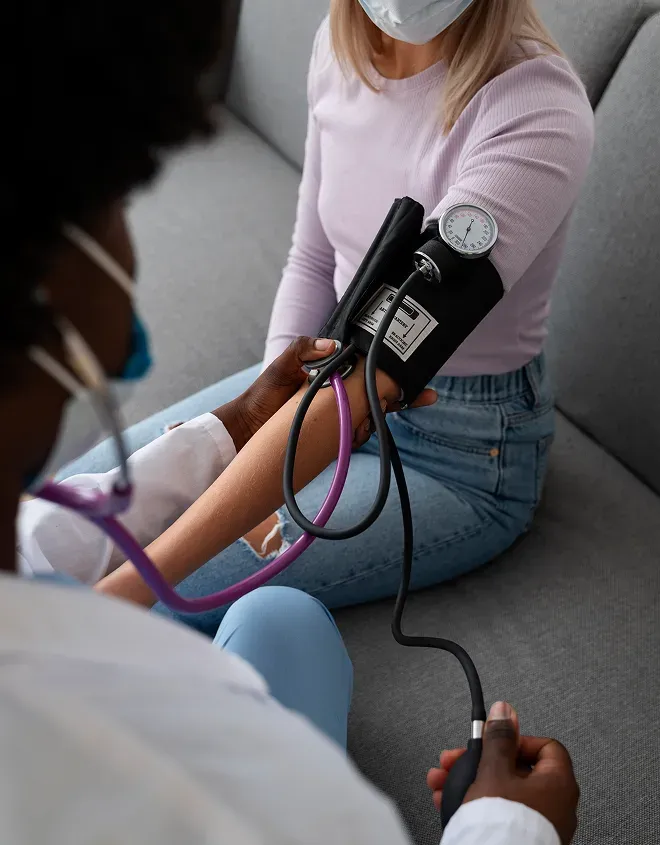Hypertension Treatment Options: Medications and Lifestyle Changes

by Dr. W. Rizvi
9 Jul 2025

High blood pressure, or hypertension, ranks among the most common long-term health issues around the world. It’s a significant risk factor for severe conditions like strokes and heart attacks. What makes it especially concerning is that it usually develops quietly, showing no apparent signs while gradually affecting the health of millions. The good news is that with the right hypertension treatment, including the proper use of medications for high blood pressure combined with proven lifestyle changes for hypertension, people can effectively control their blood pressure and reduce their risk of severe complications.

The Importance of Early Detection in Hypertension Treatment
Catching hypertension early plays a key role in managing it effectively, yet it’s something many people tend to overlook. Many people with high blood pressure feel perfectly fine and may not seek medical advice until serious complications occur. Regular screening, especially for those over 40, individuals with a family history, or those with risk factors like obesity and diabetes, can help detect hypertension before it causes irreversible damage.
Early detection helps implement both medications for high blood pressure and lifestyle changes for hypertension at a stage where they can be most effective, thus reducing the risk of diseases such as heart disease, stroke, and kidney failure.
Understanding Hypertension and Its Risks
To truly understand why managing hypertension matters, it’s helpful to start with the basics. Blood pressure reflects the force of blood moving through your arteries every time your heart contracts and relaxes. This is shown as two numbers: the systolic pressure, which is the force when your heart beats, and the diastolic pressure, measured when the heart is at rest between beats.
When blood pressure remains consistently above 130/80 mm Hg, it usually leads to a diagnosis of hypertension. This long-term elevation places additional pressure on vital organs, such as the heart, kidneys, and brain. Over time, the added strain can cause serious health issues, including heart failure, kidney disease, aneurysms, and cognitive decline. Because symptoms can be absent or subtle, many people remain unaware of their condition until serious health issues emerge.

Therefore, timely and effective hypertension treatment is critical not only to reduce blood pressure numbers but also to protect your organs and improve your quality of life.
Medications for High Blood Pressure: Main Types and How They Work
Although making lifestyle changes is essential for controlling blood pressure, many individuals also need medication to keep their levels within a healthy range. Various types of blood pressure medicines work in different ways:
- Diuretics: Commonly used as an initial treatment, diuretics—sometimes referred to as "water pills"—help your body eliminate excess salt and fluid through the kidneys, which reduces blood volume and lowers blood pressure. Thiazide diuretics like hydrochlorothiazide and chlorthalidone are commonly used. They are inexpensive and effective, especially when combined with lifestyle changes.
- ACE Inhibitors (Angiotensin-Converting Enzyme Inhibitors): By preventing vessel constriction, ACE inhibitors help relax arteries and lower blood pressure. Drugs in this category include lisinopril, enalapril, and ramipril. They are beneficial for patients with diabetes or kidney problems.
- ARBs (Angiotensin II Receptor Blockers): ARBs block the effect of angiotensin II by preventing it from binding to receptors in blood vessels. This results in dilated vessels and a reduction in blood pressure. Examples include losartan, valsartan, and candesartan. ARBs are an excellent alternative for those who experience coughing or other side effects from ACE inhibitors.
- Calcium Channel Blockers: These agents prevent calcium from entering cells of the heart and arteries, causing the vessels to relax. This reduces the pressure in the arteries, making it easier for the heart to pump. Amlodipine and diltiazem are widely prescribed calcium channel blockers.
- Beta Blockers: Beta-blockers reduce the heart rate and the strength of each heartbeat, thereby lowering blood pressure and decreasing the heart’s oxygen demand. Common drugs include metoprolol, atenolol, and propranolol. While they are no longer the first choice for uncomplicated hypertension, they are essential for patients with heart disease.
- Other medications: In some instances, alpha-blockers, central agonists, or vasodilators are used when other treatments are ineffective or unsuitable.
Why Lifestyle Changes Matter in Managing Hypertension
While medication plays a vital role in controlling high blood pressure, lasting success depends largely on adopting healthy lifestyle habits. These changes give people more control over their condition and can sometimes reduce or even eliminate the need for medication.
Nutrition:
What you eat has a significant impact on your blood pressure, and following the DASH diet—short for Dietary Approaches to Stop Hypertension—is one of the most effective ways to keep it in check. This eating plan emphasizes loading up on fruits and vegetables because they’re packed with potassium and fiber, both of which help balance blood pressure. It also encourages choosing whole grains over refined ones and incorporating lean proteins, such as chicken, fish, beans, and nuts. Cutting back on unhealthy fats, especially saturated and trans fats, is another key part. Perhaps most importantly, keeping your sodium intake low—ideally under 1,500 milligrams per day—is essential, as too much salt causes your body to retain water, thereby increasing your blood pressure.
Physical Activity:
Regular exercise enhances heart health by making blood vessels more elastic and improving blood flow. Adults should aim for at least 150 minutes a week of moderate-intensity aerobic activity—think such as brisk walking, swimming, cycling, or dancing. Adding strength training two times a week also benefits the heart.
Weight Control:
Having excess body weight puts added strain on your heart and is connected to increased blood pressure. Combining a healthier diet with consistent exercise is the most effective approach to achieving and maintaining this weight loss.
Smoking:
Smoking quickly damages your blood vessels and speeds up the risks associated with high blood pressure. Giving up smoking helps maintain healthier blood vessels.
Managing Stress:
Long-term stress triggers the release of hormones that constrict blood vessels, leading to elevated blood pressure. Activities such as meditation, yoga, deep breathing exercises, and spending time outdoors can help soothe your mind.
Monitoring and Managing Hypertension: A Continuous Effort
Keeping blood pressure in check isn’t a one-time fix—it requires ongoing attention.
- Tracking at Home: Having a reliable blood pressure monitor allows you to keep track of your readings regularly. This helps you notice patterns and understand what affects your blood pressure.
- Regular Medical Checkups: Routine visits enable your doctor to assess the effectiveness of your treatment and make adjustments as needed. Tests may also be done to check the health of your heart, kidneys, and other organs.
New Advances and Technologies in Hypertension Care
Hypertension treatment is constantly changing as new methods emerge, offering hope for better results:
- Renal Denervation: This minimally invasive procedure targets specific nerves around the kidneys that contribute to elevated blood pressure. It’s particularly promising for people whose hypertension doesn’t respond well to medication.
- Digital Health Tools: Nowadays, smartphone apps and wearable gadgets enable ongoing tracking of blood pressure and daily habits. These technologies support more personalized treatment plans and better interaction between patients and doctors.
- Pharmacogenetics: Researchers are developing methods to tailor blood pressure medications to an individual’s genetic profile. This method aims to boost how well drugs work while reducing the chance of side effects.
Final Thoughts
Managing high blood pressure isn’t just about popping pills. It’s a continuous effort that involves working closely with your healthcare team and making steady changes to your daily habits. When the proper medications are paired with lifestyle choices that support your heart, you have a significantly better chance of maintaining healthy blood pressure, reducing risks, and overall feeling healthier.
Contact your Endocrinologist today, Dr. W. Rizvi at R-endocrinology, to learn more about Hypertension Treatment Options and Medications and Lifestyle Changes.
Resource:
The Best Online Obesity Treatment Options: How to Start Your Weight Loss Journey from Home
Share This:
Disclaimer
*Please note that the information provided in the blogs and articles is intended for general informational purposes only and should not be considered medical advice. We strive to bring you the latest information about the endocrine world; however, we encourage you to seek individual medical advice and treatment options during your consultation with a qualified healthcare professional. *
